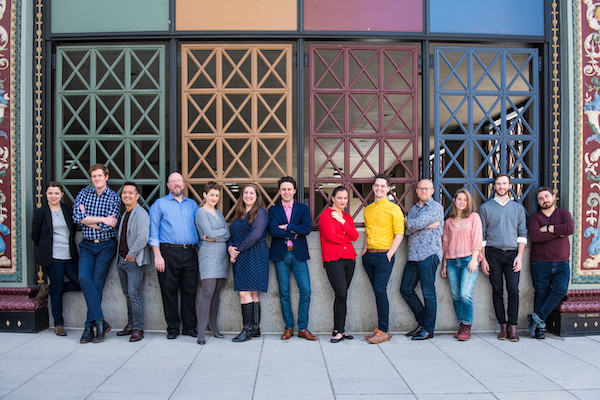The Thirteen wraps ambitious season with epic finale

The Thirteen performed Frank Martin’s Mass for Double Choir Friday night at Episcopal High School Chapel in Alexandria.
Conductor Matthew Robertson regularly scales mountains with his elite chamber choir, The Thirteen. The ensemble’s season has already included Monteverdi’s 1610 Vespers, Rachmaninoff’s All-Night Vigil, and Barber’s Reincarnations paired with Britten’s Sacred and Profane.
Their final program featured not merely Frank Martin’s daunting Mass for Double Choir, but also challenging secular song collections by Poulenc and Ravel, heard Friday night at Episcopal High School’s chapel in Alexandria.
Among his sixteen singers for this entirely unaccompanied concert, Robertson welcomed four young members of this year’s Vocal Fellows program. The group, standing in sections, sounded impeccably balanced in the opening SATB work, Poulenc’s Sept Chansons. Set to surrealist poetry by Guillaume Apollinaire and Paul Éluard, these choral songs bristled with finely tuned chromatic harmonies, such as the wildly dissonant chord that concluded the first song.
The ecstatic music accompanying Éluard’s delirious praise of the breasts of Nusch, his second wife, was a high point in the third song. The tenor section displayed a strong, unified group sound toward the end of the fourth song, along with some rarefied stratospheric singing from the sopranos. Robertson led the set with exceptionally clear gestures, but strain started to show in the tuning of the rapid sixth song and in the beauty of the soprano sound in the extended high range.
Further cracks appeared in the choral texture in the double-choir format of the Martin work, likely due to the pressure added by having only two singers on each part. In the opening, chant-like phrase of the Kyrie, the blend of both alto sections suffered as they were exposed. Toward the end of the extended first Kyrie section, extremely loud dynamics almost swallowed up the high B called for in the first soprano part.
Martin turned often to the 4-3 suspension structure at cadences, a stock choral motif that the choir tuned with consummate grace. The male voices in the second choir sounded overtaxed in the “Et in terra” section of the Gloria, but the second choir together provided a rock-solid, carefully tuned D minor chordal drone in the “Domine deus” section. The Credo movement featured beautiful, overlapping effects at “Deum de deo” and a serene homophonic “Et incarnatus est,” followed by upward trickles of melody at “Et resurrexit.”
The best moments came in the murmuring undulations of the Sanctus, with the cool harmonies of the opening section contrasting with the more daring, active “Pleni sunt coeli.” Thrilling shouts bubbled up in the “Osanna” responses, like celestial choirs volleying melodic motifs at one another. The closing Agnus Dei was a slow burn, with chromatic alterations to the litany’s melody carefully set in place by Robertson so that they glowed like embers.
Robertson made the reasonable decision to interpolate other works between Martin’s five movements. It had the unintended effect, however, of destabilizing the unity and intonation of the ensemble, with the singers still positioned in double-choir format. For the intervening works, composed in four parts, the altos and the tenors were now divided on either side of the unified sopranos and basses, which caused some minor problems of cohesion.
Two works by Amy Beach were pleasant discoveries, beginning with Pax Nobiscum, set in a varied strophic style to four of the five stanzas from a hymn by Earl Marlatt. The singers displayed admirable breath support in the work’s long phrases, apart from what sounded like an early entrance at the start of the third stanza. Beach’s miniature “Peace I Leave With You” was particularly sweet and tender.
Another novelty was the austere Hearken to My Prayer by Jewish composer Julius Chajes, who fled Austria in the 1930s and settled in the United States. Robertson and his forces drew out the strict fugal opening of the piece, which softened to less contrapuntal textures while retaining a reflective solemnity. Robert Nathaniel Dett, born in Canada from a family that had escaped slavery in the United States, achieved similar results in his meditative O Holy Lord, but with reference to tropes from Gospel music in a litany-like effect.
At about this point in the program, which lasted 80 minutes without an intermission, the singers, especially at the high end, seemed to tire a bit vocally. A long pause, while Robertson introduced the final work, Ravel’s Trois Chansons, restored the group’s energy, especially in the two manic outer songs. Fine solo work from soprano Andréa Walker, mezzo-soprano Aryssa Burrs, and tenor Andrew Bearden Brown in the middle song, “Trois beaux oiseaux du Paradis,” crowned an evening of Herculean labors.
The program will be repeated 7:30 p.m. Saturday and 5 p.m. Sunday. thethirteenchoir.org


